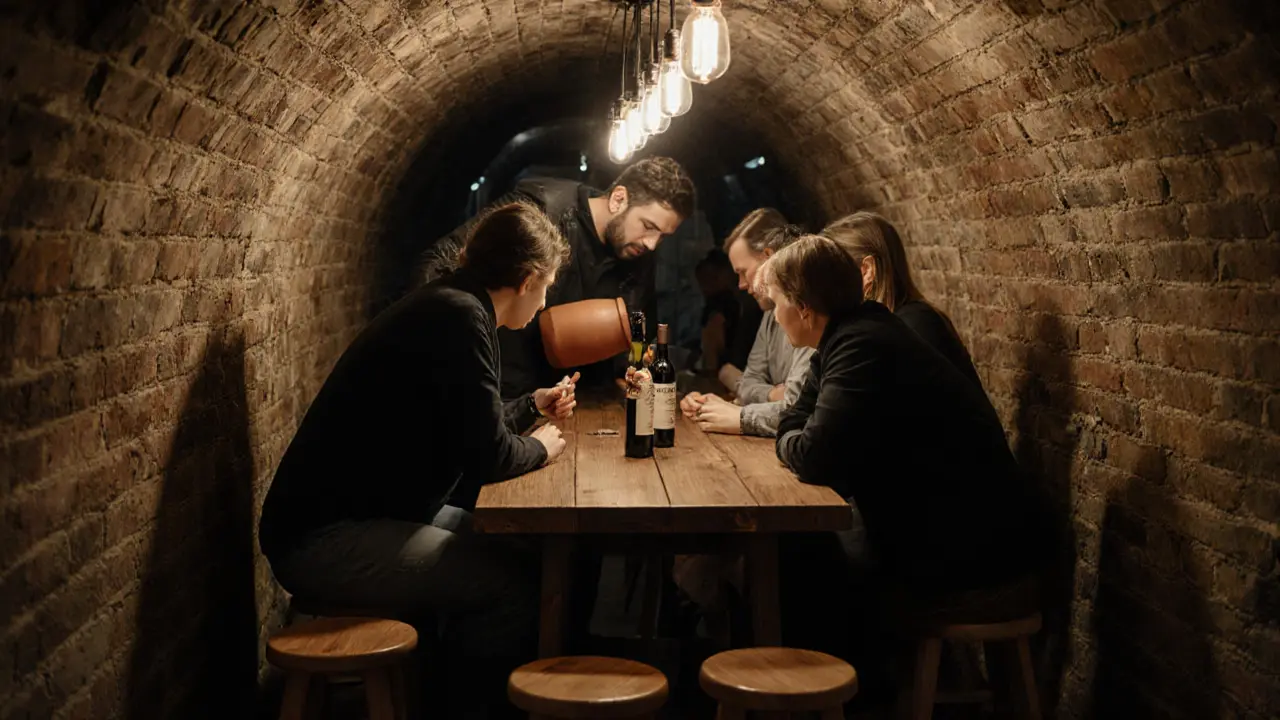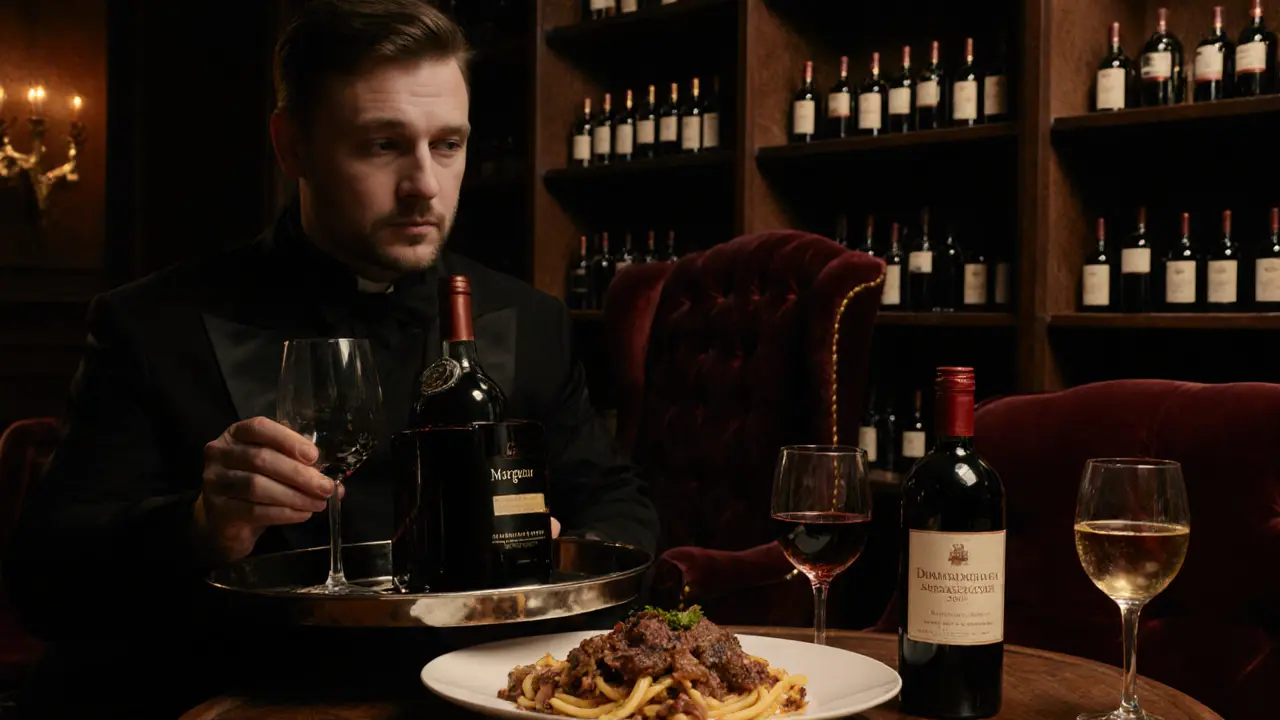London’s wine scene isn’t just about sipping red in a dimly lit corner-it’s a full-blown experience for those who know their terroir from their tannins.
If you think London nightlife means loud clubs and cheap cocktails, you’re missing half the story. The city has quietly become one of Europe’s most exciting destinations for serious wine lovers. From hidden cellar bars in Shoreditch to Michelin-starred wine rooms in Mayfair, there’s a place where every glass tells a story-and every bottle is chosen with care.
Forget the usual tourist traps. The best spots for wine connoisseurs in London don’t have neon signs or bottle service. They have staff who can tell you the exact elevation of the vineyard, the year the vines were grafted, and how the 2021 frost affected the acidity. These are places where you don’t just order a glass-you ask for a journey.
1. The Wine Bar (Soho) - Where Tradition Meets Curiosity
Open since 2018, The Wine Bar in Soho is the quiet rebel of London’s wine scene. It doesn’t have a website. No Instagram page. Just a small wooden door next to a dry cleaner. Inside, you’ll find 120 bottles lined up by region, not grape. The sommelier, Luca Moretti, doesn’t push expensive bottles-he pushes discovery. He’ll hand you a 2019 Terret Noir from Languedoc, grown on limestone slopes near Montpellier, and explain why it tastes like crushed violets and wet slate. You won’t find this wine anywhere else in the city.
They serve food, but only when it complements the wine. Think aged Pecorino with quince paste, or grilled sardines with rosemary oil. No menus. Just a list of three current pairings scribbled on a chalkboard. It’s the kind of place where you leave after three hours, not because you drank too much, but because you forgot the time.
2. Noble Rot (Brixton) - The Underground Tasting Room
Noble Rot started as a blog. Now it’s a cult favorite tucked under a railway arch in Brixton. The space is small-barely 20 seats-and the lighting is low. But the wine list? It’s a masterclass. They focus on natural wines from small producers who don’t use additives or industrial yeasts. You’ll find bottles from Georgia fermented in clay amphorae, or a 2022 Pinot Noir from Oregon’s Willamette Valley that was aged in chestnut barrels.
Every Thursday, they host a “Grower’s Night” where a producer flies in to pour their wines and answer questions. Last month, it was a third-generation grower from the Mosel who brought five bottles from his family’s 80-year-old vines. Tickets sell out in minutes. You don’t book online-you email. And if they like your tone, they reply.
3. Le Bab (Mayfair) - Wine With a Side of Luxury
If you want the full luxury experience, Le Bab in Mayfair is where the industry’s insiders go after dinner. It’s not a traditional wine bar-it’s a private cellar with velvet chairs, low lighting, and a team of five sommeliers who rotate shifts to keep the knowledge fresh. The wine list spans 1,200 bottles, with half of them unavailable in retail stores. You’ll find a 1989 Château Margaux, a 2001 Domaine de la Romanée-Conti, and a rare 2018 Chardonnay from Chablis that was aged in old oak for 36 months.
They don’t serve food, but they’ll arrange a private tasting with a chef from one of London’s top restaurants. One recent evening, a guest ordered a 2015 Barolo and got a custom plate of wild boar ragù with truffle-infused gnocchi made by a chef from Piedmont. The price? £180 per person. Worth it if you’ve ever wanted to taste a wine that’s been cellared longer than you’ve been alive.

4. The Glass House (Camden) - For the Bold and the Curious
Camden isn’t known for fine wine. But The Glass House changed that. Opened in 2023, this place is all about experimentation. The owner, Elena Ruiz, used to work at a winery in Mendoza. She brings in wines that most London bars wouldn’t touch-orange wines from Slovenia, amphora-aged Rieslings from Austria, and even a sparkling wine made from elderflower and wild grapes in the Pyrenees.
They host monthly “Wine Roulette” nights. You pick a color (red, white, orange, rosé), and the staff pick the bottle. You don’t know what it is until you taste it. Last month, someone got a 2020 Pet Nat from a vineyard in the Czech Republic. No one had heard of it. Everyone left with a new favorite.
5. Wine & Co. (Notting Hill) - The Community Hub
Wine & Co. feels like your friend’s basement-except their friend is a certified Master of Wine. This place has no pretense. No velvet ropes. Just a long wooden counter, a fridge full of chilled bottles, and a wall of books on wine history. They offer tasting flights for £15-three 50ml pours of wines from the same region, side by side. Try the 2020s from the Loire Valley: Sauvignon Blanc from Sancerre, Chenin Blanc from Vouvray, and Cabernet Franc from Chinon. Taste the difference in minerality. Notice how one has more acidity, another more earth.
They also run free monthly workshops: “How to Taste Like a Pro,” “Decoding Labels,” “Understanding Terroir.” No sales pitch. Just honest talk. People come for the wine, stay for the conversation.
What Makes a Great Wine Bar in London?
Not all wine bars are created equal. Here’s what separates the good from the great:
- Staff knowledge: Can they tell you the vintage, the soil type, and the winemaker’s philosophy? If they just recite tasting notes from a bottle, walk out.
- Wine by the glass: A real wine bar offers at least 15 wines by the glass, including rare or small-production bottles. If they only have the same three Pinot Noirs everyone else carries, it’s not worth your time.
- No corkage fee: Many top wine bars in London let you bring your own bottle. If they charge more than £15, they’re more interested in profit than passion.
- Seasonal rotation: The best places change their list every 4-6 weeks. If the menu looks like it’s been the same since 2020, they’re not keeping up.

Pro Tips for Wine Lovers in London
- Go on weekdays. Weekends are crowded. Tuesday and Wednesday nights are when the real connoisseurs show up.
- Ask for the “house discovery bottle.” Every good bar has one-a hidden gem under £30 that surprises even seasoned drinkers.
- Don’t be afraid to say “I don’t know.” The best sommeliers love helping people learn, not showing off.
- Keep a small notebook. Write down the name, region, and your notes. You’ll forget what you liked by next week.
- Follow the sommeliers on Instagram. Many post their weekly picks. It’s the best way to find new spots before they go viral.
What to Avoid
There are plenty of places that call themselves wine bars but are just cocktail lounges with extra glasses. Watch out for:
- Wines listed with tasting notes written in marketing jargon (“notes of moonlight and nostalgia”)
- Only French and Italian wines on the list
- Staff who can’t tell you where the grapes were grown
- Overpriced “premium” bottles that are just mass-produced brands
If it feels like a nightclub with wine labels stuck on bottles, leave. You deserve better.
Final Thought: It’s Not About the Price, It’s About the Story
The best wine in London isn’t the most expensive. It’s the one that connects you-to a place, a person, a moment. Maybe it’s a bottle from a vineyard that survived war. Or a wine made by a single farmer who presses grapes by hand. That’s what makes these bars special. They don’t sell alcohol. They sell stories.
So next time you’re in London and want to skip the clubs, head to one of these places. Sit at the counter. Ask a question. Let someone guide you. You might just find your new favorite wine-and your new favorite night out.
Are there wine bars in London that allow you to bring your own bottle?
Yes, many top wine bars in London, including Wine & Co. in Notting Hill and The Wine Bar in Soho, allow you to bring your own bottle with a modest corkage fee-usually between £10 and £15. Some, like Noble Rot, don’t charge at all if you’ve dined with them before. Always call ahead to confirm their policy.
What’s the best time to visit wine bars in London for a quiet experience?
Weeknights, especially Tuesday and Wednesday, are the quietest. Most tourists and office workers are home. This is when the regulars come in-sommeliers, winemakers, and serious drinkers who want to talk about wine without the noise. Avoid Friday and Saturday nights if you’re looking for intimacy and expert attention.
Can you learn about wine without spending a lot of money in London?
Absolutely. Places like Wine & Co. offer tasting flights for £15, where you can compare three wines side by side. Many bars offer free monthly workshops on topics like terroir, labeling, and blind tasting. You don’t need to buy a £100 bottle to understand wine-you just need curiosity and the right guide.
What’s the difference between natural wine and organic wine in London bars?
Organic wine means the grapes were grown without synthetic pesticides or fertilizers. Natural wine goes further-it’s made with no added yeasts, sulfites, or filtration. Many London wine bars, especially Noble Rot and The Glass House, specialize in natural wines. They’re often cloudy, funky, and alive-different from the polished wines you find in supermarkets.
Do any London wine bars offer food pairings?
Yes. The Wine Bar in Soho and Le Bab in Mayfair offer curated small plates designed to match their wine list. These aren’t generic snacks-they’re seasonal, locally sourced, and crafted to highlight the wine’s flavor. At Noble Rot, they sometimes host chef pop-ups where the entire menu is built around one wine region.
